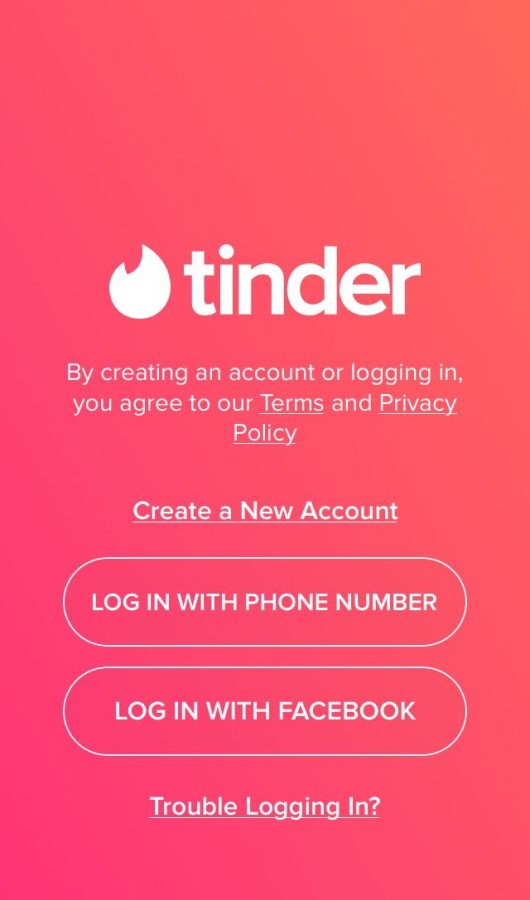Capture the campus: Dating apps battle to attract college students
April 22, 2019
Connections are everywhere.
People look to connect every day, from simple hellos when passing by, to deep conversations through the night. The human experience craves the feeling of being understood and a part of something bigger than the individual self.
With a focus on connecting students with other students, mega-apps Tinder and Bumble have launched campaigns to attract Kent State students.
According to Lauren Probyn, Director of Global Marketing & Events at Tinder, the app was created by students at USC to create connections and spark interest in meeting people in the area.
“People have been dating since the beginning of time, but a lot has changed since then,” Probyn said. “Since it was created in 2012, Tinder has been a pioneer for dating culture.”
Dating culture on college campuses continues to change more toward the digital world and the focus on helping students connect has lead Tinder innovators to create Tinder U, Probyn said.
To link college students to other students has been a challenge, and Tinder app designers meet this problem by creating Tinder U which allows students to register as current students at their educational institutes and matches these students with other student that institute and other campuses nearby.
“Tinder U was launched in August 2018 to make it easier for students to connect,” Probyn said. “It allows them to see other students in their area first while swiping.”
With a digital world developing every day, dating apps have become part of society and have shaped the way people date. This has also started a ‘war’ between dating apps, as they compete to bring in new users.
Bumble, another popular dating app, has also created campaigns to promote connections amongst college students.
“Bumble can be an incredible tool for college students to meet someone who will change the course of their lives,” a Bumble spokesperson said.
“Our college ambassador program, Bumble Honey, is one of the many ways we are able to stay relevant and connected to college communities across the globe,” a Bumble spokesperson said.
Bumble Honey focuses on recruiting current students at universities and colleges and has these students share the empowerment mission of Bumble.
“They (Bumble Ambassadors) support grassroots marketing, events, partnerships, local PR, community research and content creation to grow awareness for Bumble as a mission-driven platform and brand,” a Bumble spokesperson said.
The mission of feeling like anyone can “make the first move” is spread at Kent State by Belma Cazanovic, a junior public health and nursing student, who serves as campus director for Bumble.
One aspect of the Bumble Honey program involves planning fun and relevant programs students will want to attend, Cazanovic said.
“They (Bumble) give us the creative freedom to bring it (the Bumble Honey programming) to our campus. Every campus is different, and they trust us to make those decisions,” Cazanovic said.
Some of the events Bumble has sponsored at Kent include holiday themed parties and open bar tabs at local bars, said Cazanovic.
A major part of what fuels Bumble’s mission is a partnership Bumble created is with athletic star Serena Williams to help women’s empowerment and this partnership has fueled a lot of the programming initiatives with the Bumble Honey program, said Cazanovic.
Both Tinder and Bumble have focused on bringing college involvement to their apps through partnerships.
“Tinder U announced its second annual Swipe Off competition, where the Tinder U school with the highest Swipe Right score wins a free concert with Juice WRLD and Charli XCX,” Probyn said.
Events like this are focused on getting more college students to use these dating apps and it appears to be working at Kent State.
“Kent State was announced as one of the top 25 schools reppin’ the East Coast,” Probyn said.
Tinder and Bumble both continue to grow and reach more and more college students every year. Knowing the importance of college aged users, both apps focus on bringing college students to their platforms.
“Tinder U is available in more than 1,200 colleges and universities and although we can’t share the percentage that are college students, we know that more than 50 percent of Tinder users are ages 18-25,” Probyn said.
Bumble also has seen a growth in college-aged users and considers college students a major audience.
“Bumble grows and remains relevant on every college campus and in communities across hundreds of cities,” a Bumble spokesperson said.
By focusing in on connections in the local area, this program has grown and continued to motivate users to join the app.
“Since the college ambassador program launched in 2014, Bumble’s field marketing team has scaled internationally and grown beyond just college marketing. For example, the ambassador program has grown from the “Bumble Honey” college ambassador program into one that also includes a “Queen Bee” city community building and the postgraduate “Local Bee” ambassador program,” a Bumble spokesperson said.
Kody Elsayed covers relationships. Contact him at [email protected].












